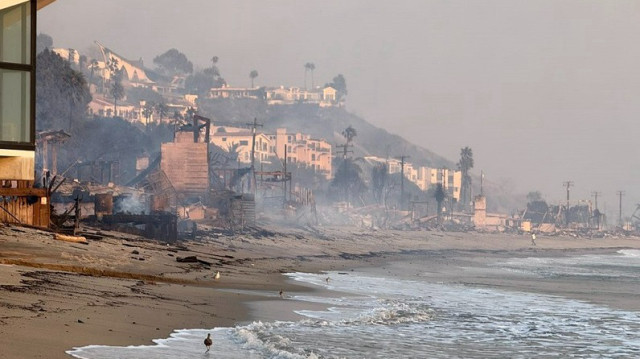
Insurers' failure to renew policies leaves homeowners without coverage
Deadly wildfires in Los Angeles, ongoing for eight days, have destroyed thousands of buildings and exposed a deepening crisis in California's insurance sector.
Over 37,000 acres of land have burned since the evening of Jan. 7 across different parts of LA, spreading rapidly due to strong winds.
More than 12,000 buildings have been damaged or rendered unusable in the wildfires, with economic losses potentially reaching $150 billion, while death toll has reached 24.
Experts warn that insurers may struggle to cover the extensive damages caused by the wildfires.
Climate change has brought about floods, storms, and wildfires in California, the US' most populous state, making it increasingly difficult for homeowners in high-risk areas to secure or afford insurance.
Companies have reduced the issuance of new Insurance policies in high-risk areas and, in some cases, have failed to renew existing policies, leaving many property owners without coverage in the wake of the disaster.
The high number of policy cancellations and insurer negligence have drawn widespread attention. Property owners in the affected areas have reported that major insurance companies had withdrawn fire coverage before the blazes broke out.
Vice President Kamala Harris also highlighted that many insurance companies had canceled policies, exacerbating the distress for affected families.
Reports indicate that seven of the 12 largest insurance companies by market share have stopped or restricted new policy issuance in California.
Before the wildfires, approximately one in every seven homes in the state had a minimum fire insurance policy. However, insurers canceled tens of thousands of policies to ensure their financial sustainability.
State Farm General, one of California's largest home insurers, announced in March 2024 that it would not renew the insurance policies of 30,000 homeowners. Insurance companies such as Chubb, its subsidiaries, and Allstate also stopped issuing new policies for high-value homes in high-risk areas.
As a result, many wildfire victims were left without coverage for their losses due to insurers' failure to renew policies before the disaster hit.
State Farm General reported that as of Jan. 10, it had begun processing approximately 4,400 home and vehicle insurance claims and had reimbursed millions of dollars to its customers.
The extensive property damage caused by the wildfires, combined with California's high real estate prices and uncertain insurance environment, makes it difficult for residents to access insurance in the future.
While the exact financial toll of the wildfires in the Greater Los Angeles area is still being calculated, experts suggest it could become the costliest disaster in US history potentially reaching billions of dollars. The damage continues to rise as the fires have yet to be fully contained.
AccuWeather has revised its preliminary estimates of the total damage to $150 billion, up from an earlier estimate of over $57 billion last week.
Jonathan Porter, senior vice president of AccuWeather, stated that the total damage and economic loss could account for nearly 4% of California's annual gross domestic product.
The estimates include a comprehensive assessment of the damage, including the destruction of homes, infrastructure, services, evacuation costs, rebuilding and relocation costs, cleanup, recovery, emergency shelter needs, and medical expenses.
JPMorgan's analysis estimates that insured losses from the wildfires could exceed $20 billion, with the total expected to rise as long as the fires persist.
Credit rating agency Morningstar DBRS' initial estimates suggest that the total insured loss could exceed $8 billion, depending on the final number of affected properties.
President Joe Biden announced last week that the federal government would cover the costs for six months, mobilizing all available resources to combat the wildfires. He also stated that the federal government would cover 100% of the disaster costs.
Meanwhile, insurance companies' stock prices have declined, as their reputations have taken a hit. Allstate's stock fell 5.6%, Chubb dropped 3.4%, Travelers lost 4.3%, American International Group fell 1.3%, and Mercury General saw a nearly 20% decline on Friday.







